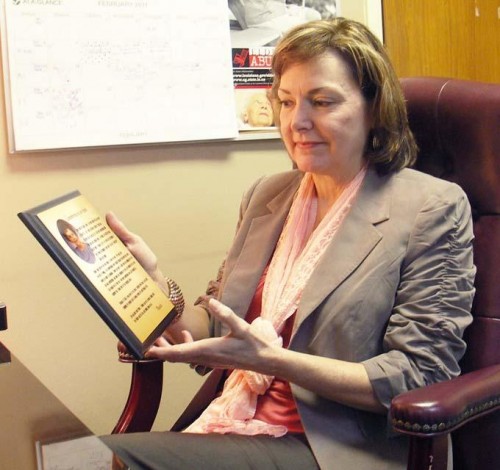
Lady Terriers head into 3rd-straight semifinals
March 2, 2011
Antoinette Robichaux
March 4, 2011It has already been called the crime of the 21st century. If nothing is done to curb it, elder abuse will only get worse as Americans live longer and 79 million baby boomers prepare to join the number of those past the age of 65, which already represents 12 percent of the population.
U.S. Census Bureau estimates indicate that by the year 2050 the number of citizens 65 and older will have jumped to 21 percent of the national total. That means there will be 86.7 million senior citizens 104 years after the first baby boomer was born.
In 1946 the average age expectancy was less than 67 years. Today the life expectancy of Americans is an average 77.5 years. There are currently an approximate 100,000 centenarians in the nation – up from approximately 200 only 65 years ago – and that number is expected to increase with advances in health care.
The oldest of the old are now the fastest growing segment of the population. In turn, the pool for potential victims of elder abuse – a crime of opportunity – is growing faster than many realize.
Among those working to educate the public and stop offenders is the Louisiana 32nd Judicial District Attorney’s office in Houma and attorney Dixie Brown.
Brown was the first female special assistant district attorney in Terrebonne Parish when she was hired in 1979. Along with working in private practice, she has had two additional special project stints in the D.A.’s office. Her current role, of which she is now in her fourth year, might be her most significant as she targets a segment of the population almost everyone will join sooner or later.
“[District Attorney Joseph L. Waitz, Jr.] and I talked several months before February 2007 about trying to develop programs to highlight elder abuse and financial exploitation,” Brown said.
When her current work in elder law began, Brown’s role was basically that of an advocate. Since then she has been among those to shed light on a societal situation often ignored or hidden.
“I compare it to where child abuse was 35 or 40 years ago. We didn’t know how to report it, talk about it, it was kind of a secret family matter,” Brown said. “We’ve come a long way in awareness, learning how to report it, how to assist the victims and prosecute the cases.
“The same circumstance in domestic violence. Trying to get victims to come forward and report it, getting law enforcement to investigate it, and for us in the prosecutors office to accommodate their needs in the justice system.”
Elder abuse is not only seen in cases where bodily injury or neglect takes place. It also involves financial exploitation committed by relatives or acquaintances, and can be identified in instances of identity theft.
“We see [elder abuse] and when we do, we report it to elderly protective services,” said Terrebonne Council on Aging Executive Director Diana Edmonson. “We see a lot of self abuse. Not eating. No personal hygiene. That happens a lot. So it is very important for the family to be involved and see that people do not neglect themselves. We see a lot of abuse where we feel grandchildren are preying on the grandparent’s money. We report that. In fact, we reported someone recently who was living in a shed [in Lafourche Parish]. We do report everything we see because it is important.”
The definition of elderly is dependent upon age and varies from state to state. In Louisiana, the law identifies persons 60 years old and older as elderly. Louisiana law also specifically protects elders from financial exploitation and extortion.
While not all 60-year-old persons are in need of special assistance or protection, the number designates a point of consideration – such as having a specific age to be able to get a driver’s license or an age to vote. “You also have to look at it on a case-by-case basis,” Brown said.
Warning signs of elder abuse include physical actions such as pushing, hitting or restraining an elder. A family member, neighbor, stranger, associate or anyone assigned to care for an older citizen, such as a health care provider or nursing home employee, could commit this.
Emotional and verbal intimidation, such as screaming at, threatening or insulting an elder also constitutes abuse.
Elder abuse is seen in instances of isolation, sexual exploitation and intentional neglect – withholding medical care or food, even hearing aids or eyeglasses – or self neglect.
According to Brown and Edmonson, the most common form of elder abuse is related to financial exploitation and includes the misuse of money, property or possessions of the elder by another person.
Criminal intent does not necessarily need to be proven in cases of elder abuse. “Criminal negligence is just a reasonable man’s standard. You don’t have to have a specific intent,” Brown said.
Not only are those who commit elder abuse subject to the law, according to Louisiana Revised Statute 14:403.2, which was passed in 1992, all citizens are required to report cases of suspected neglect or elder abuse. The law also grants civil and criminal immunity to any citizen making a report in good faith.
Brown, who serves as a board member for the Terrebonne Council on Aging, became passionate about elder law when her mother, Edna Brown, was diagnosed with early dementia at the age of 75. Her condition evolved into Alzheimer’s disease and she died in 2007 at the age of 91.
“In fact, she passed away one month after I took this job,” Brown said. “While my dad [93-year-old Willis Brown] and I cared for my mother, people would say to us, ‘You do such a good job taking care of your mom.’ It never occurred to me that there was any other way to care for a vulnerable elderly person.”
Brown said it did not take long for her to realize that there are large numbers of elderly persons who do not get proper care and are victims of mistreatment.
“My parents are really my inspiration to do this. I came to realize there is an aging population with baby boomers starting to turn 65 this year. We’ve got a growing number of people who need to be protected during the twilight years of this lives,” Brown said.
In the district attorney’s office, Brown admitted, it is unknown how prevalent elder abuse is in the region because it frequently goes unreported. Elderly victims, she said, are often reluctant to expose it. She said it is also difficult to speak specifically on how many cases involving elders are actual matters of abuse.
“Sometimes it is an age specific crime. Sometimes it may be a random crime and the elderly person is involved. This is what we do. Every file that comes through for every victim that is 60 and over gets stamped ’60-plus.’ It is like stamping a case for juveniles or domestic violence,” Brown said.
“Part of my job is to accommodate that older person … and move them forward in the justice system. What we want to do is make that process as painless as possible. The main thing is awareness and reporting it,” Brown said. “We are working to get awareness out there.”
Older adults often do not want to reveal they are victims of abuse. In the case of a parent with an adult child, the victim might not want to admit, “I raised a child that would do this to me.”
In other cases, elders do not want to acknowledge they are old and weak, and that they may have hired a caregiver who would take advantage of them. Some feel guilty when they question the characters of those they have trusted.
Brown noted a favorite quote of hers from former Vice President Hubert H. Humphrey, which had also been stated in various forms by sources ranging from Samuel Johnson to Pope John Paul II. In paraphrase it is that the moral test of society is how that society treats those who are in the dawn of life, those in the twilight of life, those in the shadows of life – the young, the old, sick, the needy and the handicapped.
Another statement that Brown said has capsulated the elderly person’s experience was made by former President Ronald Reagan in his farewell letter to the nation: “I now begin the journey that will lead me to the sunset of my life. I know for America there will always be a bright new dawn ahead.”
For those in elder law and those working as advocates for older citizens, the moral test and the bright dawn are found in a hope that public awareness will lead to actions that successfully address and reduce instances of the crime of the century being committed against its senior members.
Assistant District Attorney Dixie Brown says the life and death of her mother, Edna Brown, in 2007 boosted her interest in working on legal issues for the elderly. MIKE NIXON











